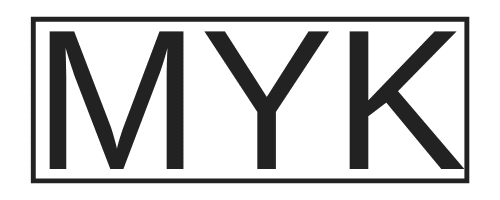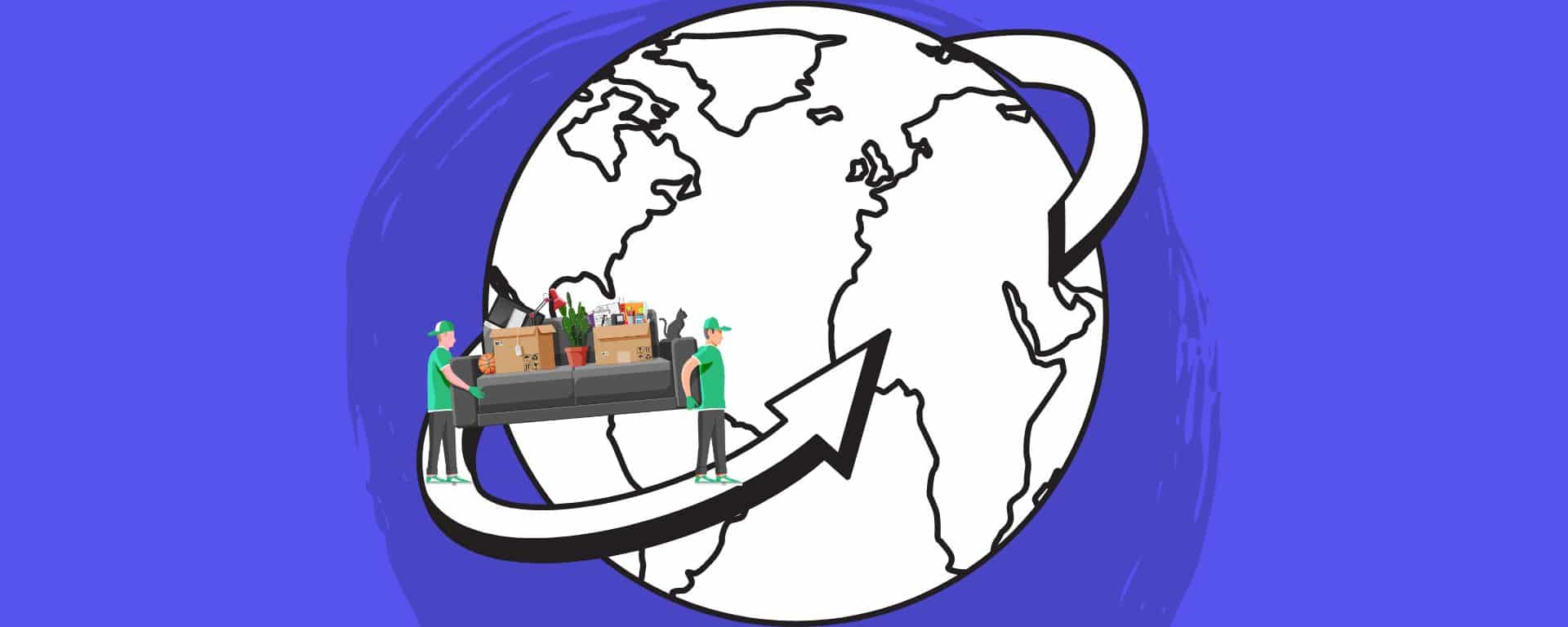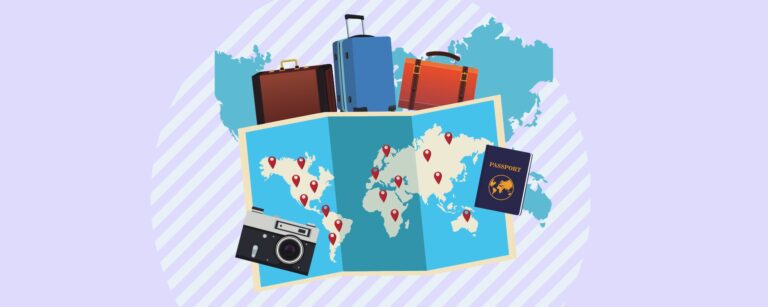Moving Internationally: Your Ultimate Guide to Living Anywhere
Relocating to a foreign country can be an energizing, life-altering journey. Dive into unfamiliar customs, dialects, and possibilities; you may feel like a new person. However, moving internationally has unique challenges requiring careful planning and preparation.
I know the challenges of moving and living abroad personally. In 2016 I left my corporate job and moved our family of 5 to Japan. Getting our visas sorted, finding a place to live, and how to move our stuff, all with three young kids in tow, was a challenge, but it has been one of the most rewarding experiences of my life that I wouldn’t change.
In this post, I will guide you through the essential steps of moving abroad, from identifying your ideal destination to securing the appropriate visa; I’ll provide valuable insights into navigating the complexities of moving abroad.
Identifying Your Ideal Destination

Choosing an ideal location is a lot of fun. The world is your oyster. Here is a list of a few things to consider when choosing your perfect destination for an international move.
Affordability
The cost of living can vary significantly from country to country and even city to city. Before deciding where to move, research the average cost of housing, food, transportation, and other essentials. Sites like Numbeo offer tools to compare the cost of living worldwide and can help you understand how far your money will go in different destinations.
Lifestyle Goals
Consider your ideal lifestyle. Are you looking for bustling urban centers with endless entertainment options? Or do you prefer serene rural landscapes that offer peace and tranquility? Consider your hobbies and interests as well – if outdoor activities are important to you, choose a destination with plenty of natural attractions nearby.
Culture & Language
The local culture and language can significantly impact your overall experience. If learning new languages excites you or immersing yourself in diverse cultures appeals, this factor should be a part of your decision-making process.
Safety & Healthcare Facilities
Your safety should always be paramount when choosing an international destination. Check government travel advisories such as the U.S. Department Of State – Bureau Of Consular Affairs, which provides information on crime rates, political stability, natural disaster risks, etc., before making any decisions. Additionally, research the quality of healthcare facilities available in your potential destination to ensure you have access to proper medical care when needed. You can also supplement local health care with international health insurance, which provides health coverage abroad.
Work Opportunities
If you plan on working remotely, freelancing, or running an online business while living abroad, choosing a location with reliable internet connectivity and coworking spaces is crucial. Websites like Coworker can help you find coworking spaces worldwide that cater specifically to digital nomads.
Securing a Visa
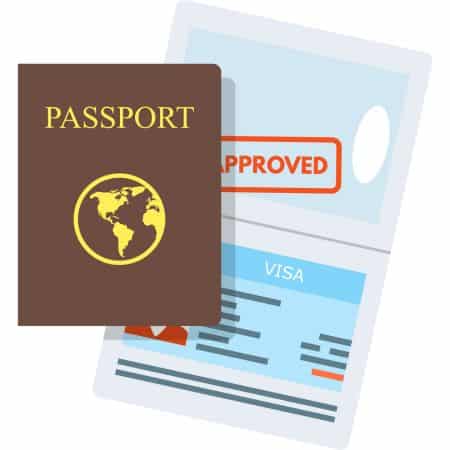
Before heading to your desired location, it is essential to understand the visa requirements and how to apply. Countries have various visa types, such as tourist visas, work permits, permanent residency options, and digital nomad visas.
Researching Visa Requirements
For accurate information about visas, visit the government website of your destination country or contact the embassy in your country. Some common visa types include:
- Tourist Visas: These are typically short-term (30-90 days) and do not allow you to work legally in the country.
- Work Permits: If you plan on working remotely while living abroad, ensure that your desired destination allows remote workers under this category.
- Permanent Residency: Some countries offer residency programs for investors or entrepreneurs who can contribute significantly to their economy.
- Digital Nomad Visa: Some countries have recently started offering digital nomad visas.
Gathering Necessary Documents
Gather all required documents before applying for a visa. Typical documentation includes:
- Passport-sized photos.
- Proof of financial means (such as bank statements).
- Medical certificates, if needed.
- Any additional info specified by the consulate or embassy.
Applying Online or In-Person
Depending on the country, you can apply for your visa online or in person at a consulate or embassy. Ensure you follow all instructions carefully and submit any required fees with your application.
Preparing for Visa Interviews
You may need an interview to finish the visa application process in certain situations. Prepare by researching common visa interview questions, practicing your answers, and dressing professionally for the appointment.
Tracking Your Application Status
After submitting your visa application, track its progress through the relevant government website or agency handling it. Be prepared to provide additional information if requested during this time.
Key Takeaway:
Write Your Pro Tip HerBefore moving internationally; it’s critical to research the visa requirements and gather all necessary documents. Countries offer various visa types, such as tourist visas, work permits, or permanent residency options. Applying online or in-person and preparing for visa interviews are essential to ensure a smooth transition into living overseas while earning remotely.
Finding Accommodation

Finding the perfect accommodation in your new country is essential to living your ultimate lifestyle. Discovering suitable living arrangements for your particular situation and preferences is vital. This section will discuss some popular accommodation choices for ex-pats and digital nomads.
Apartments and Houses
Apartments and houses are a common choice for ex-pats seeking long-term stays in their new country. You can rent or buy properties depending on your budget and commitment level. To find relevant listings, you can use local real estate websites or work with an agent who understands the local market.
Serviced Apartments
Serviced apartments might be ideal if you prefer a more flexible option with added amenities. These fully furnished units come with housekeeping services, utilities included in the rent, and sometimes even access to facilities like gyms or pools.
Tips on finding serviced apartments:
- Use online platforms like Airbnb or Booking.com to search for serviced apartment listings.
- Contact local property management companies specializing in short-term rentals.
- Ask fellow remote workers about their experiences with serviced apartments in your chosen destination.
Coworking Spaces With Living Quarters
An increasingly popular trend among digital nomads is staying at coworking spaces that offer living quarters called “coliving.” This accommodation provides workspace and living space in one location, making it convenient for remote workers. Check out Coliving.com to find coliving spaces around the world.
Tips on finding coworking spaces with living quarters:
- Search online platforms like Coworker or Nomad List for coworking spaces that offer accommodation.
- Join digital nomad communities and ask for recommendations from fellow remote workers who have stayed at coliving spaces.
Whether you prefer renting an apartment or house, staying in serviced apartments, or opting for a coliving arrangement at a coworking space, plenty of choices are available to help you move abroad and live your ultimate lifestyle while exploring new countries.
Hiring an International Movers
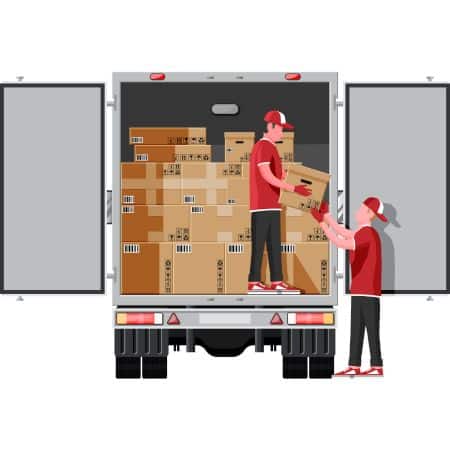
Finding a reliable international moving company can be to the moving process. This section will guide you through researching and hiring an international mover.
Researching Potential Moving Companies
The first step in hiring an international moving company is doing your research. You want to find a reputable company with experience with international moves and understand the unique challenges that come with them.
- Start by asking for recommendations from friends or family members who have moved internationally.
- Use online resources such as Yelp or Google Reviews to read reviews from previous customers.
- Check if the companies are registered with relevant organizations like FIDI (International Federation of International Movers) or IAM (International Association of Movers).
Gathering Quotes and Comparing Services
Once you’ve narrowed down your list of potential movers, it’s time to gather quotes and compare services offered by each company. It’s essential not just to look at price but also what services they provide within their package:
- Packing/unpacking services
- Furniture disassembly/reassembly
- In-home estimates
Ask for detailed quotes which outline all costs associated, including taxes/customs fees, etc., as well as any additional fees that may arise during transit, such as storage charges while waiting for clearance into another country.
The right company will make the international moving process significantly easier.
Setting Up Utilities
Moving to a new local means arranging utilities in your new dwelling, which can be quite unlike what you’re familiar with. This section will guide you through setting up essential services like electricity, water, internet, and phone.
Electricity and Water
Local utilities are typically the source of electricity and water in many countries. To set up these services in your new home:
- Research the leading providers in your area by asking locals or searching online for “best electricity and water providers.”
- Contact the chosen provider(s) with details about your property (address, size).
- Provide identification documents such as a passport or visa copy.
- Pay any required deposits or connection fees.
- Schedule an appointment for service activation if necessary.
Internet Service Providers (ISPs)
A reliable internet connection is vital while living abroad. Here’s how to find a suitable ISP:
- Browse forums like “Ex-pat Forum” for recommendations on ISPs popular among ex-pats in your destination country.
- Determine whether you need a landline-based broadband connection or mobile data plan based on speed requirements and mobility needs.
- Contact potential ISPs to inquire about their plans’ pricing options and coverage areas.
- Sign up for a plan that best suits your needs and budget.
- Arrange for installation or purchase of necessary equipment, such as modems or routers.
Consider getting an international router that will allow you to connect to the internet anywhere.
Phone Services
Setting up phone services in your new country is essential to stay connected with friends, family, and colleagues. Dual sim mobile phones are an excellent choice if you regularly move between countries. Here’s to set up your phone service:
- Determine if you need a landline connection or just a mobile service.
- If opting for a landline, contact local telecom providers to set up the service following similar steps as setting up electricity and water utilities.
- Research popular carriers in your destination country for mobile services by searching “best mobile carriers.”
- Choose a SIM card from the chosen mobile carrier and purchase it online or in-store.
- Select an appropriate calling plan based on international call rates and data usage requirements.
Setting up utilities when moving abroad requires researching local providers and understanding the specific processes involved. By following these guidelines, you’ll be well-equipped to establish essential services in your new home overseas quickly and efficiently.
Securing utilities is imperative for a successful relocation, guaranteeing access to the amenities required for everyday life. Establishing a bank account will be the next crucial step towards settling in your new home abroad.
Establishing a Bank Account
Opening a bank account in your new allows you to manage your finances, receive payments from clients or employers, and access local services more easily. To begin, we’ll cover the documents needed to open a bank account abroad and how to transfer money from your home country.
Research Banking Options
Before moving abroad:
- Research banking options available in your chosen destination.
- Consider fees, interest rates, online banking features, customer service quality, and other benefits relevant to ex-pats like yourself.
- Consider online international bank options as well.
Gather Necessary Documents
To open a bank account abroad, you’ll need several documents depending on the specific requirements of the financial institution you choose:
- Passport: Your passport is proof of identity when opening an international bank account.
- Visa: A valid visa demonstrates that you have legal permission to reside in the country where you’re opening an account.
- Tax Identification Number (TIN): Your TIN helps banks comply with domestic and international tax regulations.
- Evidence of Address: This can include utility bills or rental agreements showing your residence in a foreign country.
- Proof of Employment or Income Source: If applicable, this could be employment contracts or recent pay stubs demonstrating regular income while residing overseas.
Opening the Account
Once you have gathered all the necessary documents, visit your chosen bank’s local branch to open an account. Some banks may also offer online applications for ex-pats, which can save time and effort.
Transferring Money from Abroad
When it comes to transferring money from your home country to your new international bank account, there are several options available:
- Bank-to-Bank Transfer: This is a secure method of transferring funds directly between two banks; however, fees and exchange rates may vary depending on the institutions involved.
- Online Money Transfer Services: Companies like Wise, Revolut, or PayPal provide user-friendly platforms for sending money internationally at competitive rates with lower fees than traditional banks.
These steps will ensure you’re well-prepared to manage your finances while living abroad and earning remotely as part of your ultimate lifestyle journey.
Key Takeaway:
To establish a bank account in your new country, research banking options and gather necessary documents such as a passport, visa, tax identification number, evidence of address, and employment or income source. You can open an account by visiting the local branch or applying online for ex-pats. To transfer money from abroad to your international bank account, you can use secure methods like Bank-to-Bank Transfer or user-friendly platforms like Wise, Revolut, or PayPal, with competitive rates and lower fees than traditional banks.
FAQs
What to Consider When Moving to Another Country
When moving abroad, it’s essential to consider factors such as the cost of living, job opportunities (local, remote, or freelancing), language barriers, cultural differences, healthcare system, and safety. Additionally, research the visa requirements and necessary paperwork for residency. It’s also essential to plan for housing arrangements and understand local customs.
How can moving abroad change you?
Moving abroad can lead to personal growth by exposing you to new cultures and experiences. It may improve your adaptability skills and broaden your perspective on life. Living in a different country often enhances problem-solving abilities, fostering independence and self-reliance.
What are some good reasons to move to another country?
Career advancement or pursuing educational opportunities could be a good reason for relocating internationally. Other reasons include seeking a better quality of life or experiencing new cultures firsthand. Some people move abroad for love or family commitments, while lower living costs attract others.
What are some challenges of moving to another country?
The challenges of relocating internationally include adapting to cultural differences, overcoming language barriers, establishing social connections in unfamiliar environments, navigating bureaucracy (e.g., visas), securing housing arrangements, and setting up utilities, bank accounts, and healthcare access – all while managing homesickness and potential isolation from loved ones back home.
What are some international moving companies?
Here is a list of some reputable international moving companies.
- International Van Lines
- American Van Lines
- Atlas Van Lines
When considering an international move, you want to choose an international moving company that provides support in your destination country. Be sure to research international movers and what services they offer.
Final Thoughts
Moving internationally can be an exciting and life-changing experience. You can make the transition smoother and less stressful by identifying your ideal destination, securing a visa, finding accommodation, setting up utilities, and establishing a bank account.
With the rise of remote work opportunities, earning a living while living your ultimate lifestyle abroad is easier than ever. Don’t let fear or uncertainty keep you from pursuing your dreams of moving abroad.
